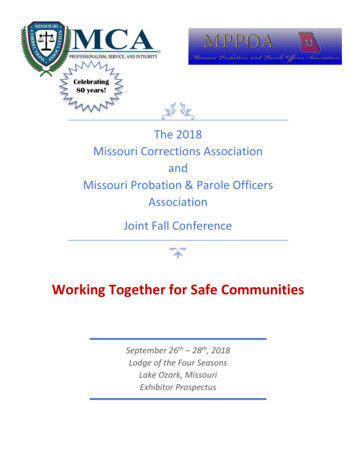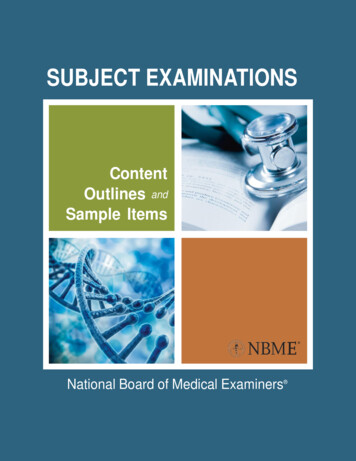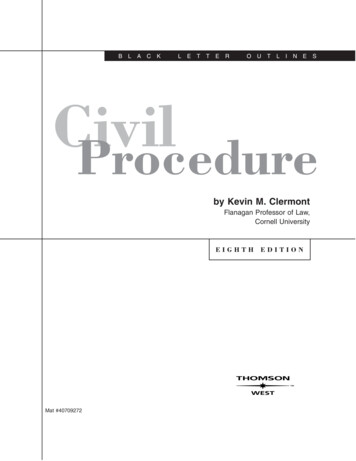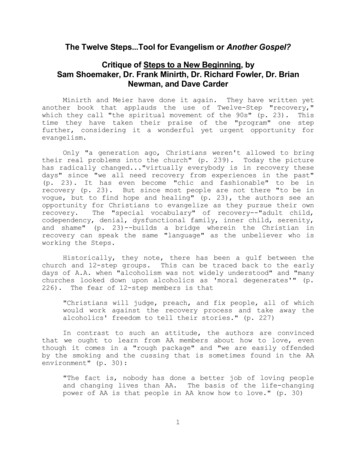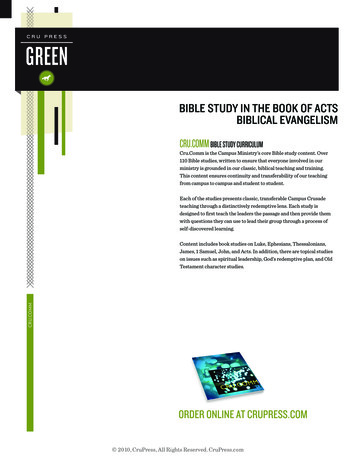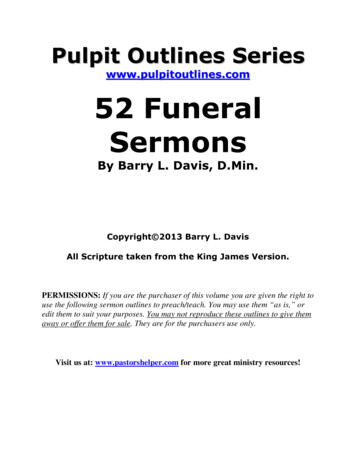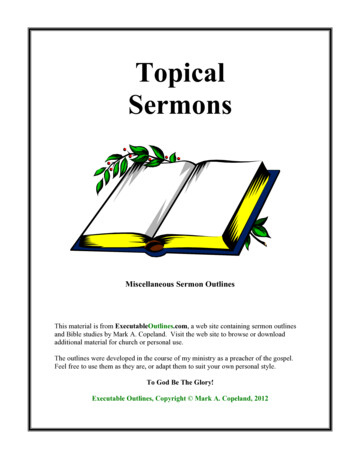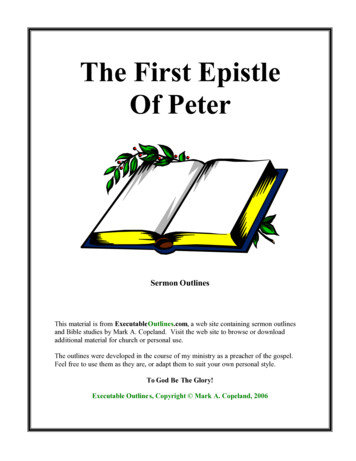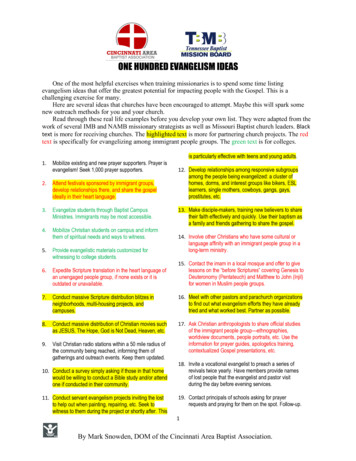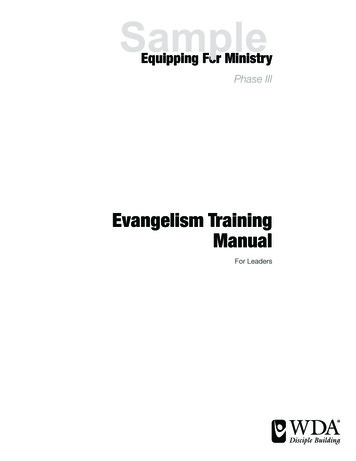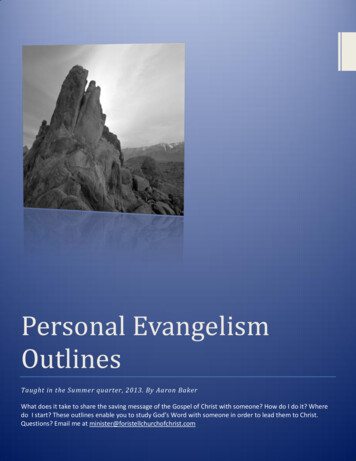
Transcription
Personal EvangelismOutlinesTaught in the Summer quarter, 2013. By Aaron BakerWhat does it take to share the saving message of the Gospel of Christ with someone? How do I do it? Wheredo I start? These outlines enable you to study God’s Word with someone in order to lead them to Christ.Questions? Email me at minister@foristellchurchofchrist.com
Table of ContentsThe Power of One Conversion . 2Evangelism, What Is It? . 4General Information About the Books of the Bible . 5Outline & Summary of the Bible . 6God’s Chain of Authority . 8Personal Worker’s Prayer . 9Tips for Evangelism: Door Knocking. 10God’s Plan: Established . 12God’s Plan: Unfolded . 13God’s King & Kingdom . 14Tips for Evangelism: Prospecting . 15Ruining the plan: Sin . 16Tips for Evangelism: Handling Objections . 18God’s Plan: Organization of the Church. 19Tips for Evangelism: Closing Techniques . 21God’s Plan: Worship of the Church. 22God’s Plan Restored: His plan to save man . 243 Time Periods of the Bible . 27Evangelism Outlines1
The Power of One ConversionPersonal EvangelismBear Valley Bible Institute at DenverTaught by: Wayne BurgerDuring the Civil War in this country a young woman learned the truth and obeyed the gospel.Her boyfriend, J. H. Halbrook, was in the Confederate army and was captured by the Union forces. Hewas kept in prison in Michigan until the war was over. At that time he was given a ticket to Nashville,Tennessee and 2.50. From Nashville he returned to his home in Centerville, Tennessee to find whatwas left of his family and home. He found his girlfriend and they were married. She taught him thegospel and he obeyed it.He began to teach his friends and neighbors as he preached in the area. He realized that if hewas going to preach he needed more education so determined to attend Mars Hill Bible School that wasoperated by T. B. Larimore in north Alabama. When he finished his study, rather than go back toTennessee, he went farther south into Walker, Marion, Fayette, and Lamar counties in Alabama. Hepreached and established churches.One of his converts was C. A. Wheeler. Wheeler began to preach and through his preachingstarted over 100 congregations and baptized over 6,000 people. Wheeler came into the community ofCarbon Hill, Alabama where the Lord's church had not been established. He needed a song leader forthe meeting that he was going to hold at the schoolhouse. A young man, who was a member of a BaptistChurch was recommended. As that young man listened each night, he took notes and went home tostudy what he was hearing. Before the week was over he obeyed the gospel. That young man was GusNichols.A couple of years after his conversion Gus began to preach and through the years of hispreaching there were over 12,000 people baptized and several congregations started. Among those heconverted were his parents and three of his brothers who also became gospel preachers as did three ofhis nephews or nieces' husbands.Gus and his wife Matilda had eight children, four boys and four girls. The four boys becamegospel preachers. Three of the daughters married full-time preachers and the fourth daughter married aman who supported himself in the insurance business, but who preached by appointment. Totally, therewere 16 preachers in Gus Nichols' immediate family and only God knows how many people have beenled to the Lord through their work. Flavil, one of Gus' sons baptized over 3,000. Hardeman, another ofGus' sons has baptized over 8,000 people.While Gus was living in Carbon Hill he started the church in Jasper, Alabama. He then movedto Northport, Alabama and preached there two years. He then returned to preach for the church inJasper. He preached for the church in Jasper for forty-three years. During that time over forty men fromthat congregation became preachers.Evangelism Outlines2
Only God knows how many people were led to the Lord through the preachers which came as aresult of a young girl in middle Tennessee obeying the gospel about a hundred and fifty years ago. Mayeach of us seek to bring someone to the Lord. You may never know how God may use that person toreach others.- Wayne BurgerEvangelism Outlines3
Evangelism, What Is It?1. The Greek word for “Gospel” is (euaggelion) EUANGELION – Mt 9:35; Mark 1:1;a. To Anglicize the Greek word would make it read, “evangel”b. Therefore, an “Evangelist” is a person who preaches or teaches the “Gospel”i. As with Philip the Evangelist - Acts 21:8ii. As with Timothy who was to do the work of an Evangelist – 2 Tim 4:5iii. Evangelists (euaggelisthv) were given to build up the body of Christ – Eph 4:112. The “Gospel” is to be preached to every creature – Mk 16:15; Rom 15:19a. The Gospel has the power to save – Rom 1:16; Eph 1:13b. People are called through the Gospel – 2 Thess 2:14c. Obeying the Gospel makes a person become a child of God – Rom 6:3, 4, 17; 1 Cor 4:15; 1 Pet4:173. When the Gospel is preached to people, they are then “Evangelized”a. The Greek word is EVANGELIDZO #2097 (euaggelizw)b. It is used of people who have a good message spoken, or preached to them – Mt 11:5; Lk 3:18;4:43; 9:6; Acts 5:42; 8:4, 12, 25, 35, 40c. This means that as the early Christians were going to new and different places, their preachingthe Gospel of Jesus Christ was actually evangelizing – Acts 10:36; 11:20; 14:7, 15, 21; Rom 1:15,etc.4. Therefore, evangelism is the person or process of taking the saving message of the Gospel to the lost.5. Evangelists:a. Generally speaking, all Christians are evangelists – Mt 28:18-20b. Specifically speaking, in the NT this word can be used restrictively and is the equivalent of aGospel preacher – see Ac 21:8; Eph 4:11; 2 Tim 4:5. In this sense, women cannot be“evangelists” – 1 Cor 14:34; 2 Tim 2:12.11Jackson, Wayne. Bible Words and Theological Terms Made Easy. Courier Publications: Stockton, 2002. Pg 53.Evangelism Outlines4
General Information About the Books of the BibleOld oshuaJudgesRuth1 &2 Samuel1&2 Kings1&2 siastesSong of SolomonDescriptionThese five books arecalled the “Law”. They arealso called the“Pentateuch”, whichmeans five volumes.These are books ofHistory because they givethe history of God’speople, Israel.These are books of Poetryand Wisdom. These arealso called WisdomLiterature.New TestamentMatthewMarkLukeJohnActsRomans1 & 2 1 & 2 Thessalonians1 & 2 TimothyTitusPhilemonHebrewsJames1 & 2 Peter1 & 2 & 3 JohnJudeDescriptionThese are called theGospels and coverthe birth, life, works,and death of Jesus.History – This tellshistory of the church.It covers thebeginning and spreadof the church duringits first 30 years.Paul’s Letters –These are letterswritten by Paul.There are twocategories: thosewritten to churchesand those written toindividuals. Listedfrom longest toshortest.General Letters –These were writtenby different peopleto a generalaudience.Prophecy – Thetheme of this book isthat Christians andthe church will bevictorious.IsaiahMajor Prophets – notJeremiahbecause they are moreLamentationsimportant that otherEzekielprophets, but becauseDanielthey are longer books.HoseaJoelAmosObadiahMinor Prophets –Jonahbecause these books areRevelationMicahshorter in length than chiThe Old Testament was written in Hebrew and the new Testament in Greek. These 66 books werewritten by about 40 writers over a period of about 1,600 years (1,500 BC to 100 AD). There were 8 NewTestament writers: Matthew, Mark, Luke, John, Peter, Paul, James and Jude.Evangelism Outlines5
Outline & Summary of the BiblePeriod1. Antedilivian (Before the Flood)a. Creationb. Fall of manc. Corruption of man2. Postdiluvian (After the Flood)a. Events of the floodb. Noah’s Drunkenessc. Generations of Noahd. Tower of Babel3. Patriarchala. Abrahamb. Isaacc. Jacobd. Joseph4. Egyptian Bondagea. Moses’ birthb. Plagues on Egypt5. Wilderness Wanderingsa. Passover begins(Ex. 12, 13)b. Escape from Egypt(Ex 14, 15)c. Getting to Mt. Sinai(Ex 16-18)d. At Mt. Sinai(Ex 19 – Num. 10)i. 10 commandments and other laws (Ex 19-24)ii. Instructions for Tabernacle(Ex 25-40)iii. Final days at Sinai(Num 1-10)e. Events in Wilderness(Num 11 – Deut.)i. 38 years of wandering (Num 12-19)ii. Last year of wandering (Num 20 – Deut.)Where in the BibleGenesis 1-6Genesis 7-11Genesis 12-50Exodus 1-11Exodus 12 Deuteronomy6. Conquest of CanaanJoshua7. Judges of IsraelJudges – 1 Sam88. United Kingdoma. Saulb. DavidEvangelism Outlines1 Sam 8 – 1 Kgs 111 Chron 1 – 2 Chron 9Psalms, Proverbs, Eccl.6
c. Solomon9. Divided Kingdom (922 BC)a. Israel – 10 Northern Tribesb. Judah – 2 Southern Tribes1 Kgs 12 – 2 Kgs 17:182 Chron 10-36Major & Minor Prophets10. Kingdom of Judah continues alonea. Israel led into Assyrian Captivity (722 BC)b. Judah Existed until 586 BC2 Kgs 17:18-25:3011. Babylonian Captivitya. After Israel went into Assyrian captivity Judahcontinued to live in Palestine about 135 yearsb. They were then taken into Babylonian captivitywhere they stayed 70 yearsJeremiah,Lamentations,Ezekiel, Daniel,Esther12. Restoration of the Jewsa. God’s people were led back to Palestine in 3 groupsb. They rebuilt the temple, the wall of the city and homesEzra, NehemiahHaggai, ZechariahMalachi13. Between the testamentsa. From the death of Malachi until John the baptizer was 400 yearsb. During this time God did not communicate with His people through prophets.14. Life of Christa. John the baptizer came to prepare the way for Jesusb. Jesus came and some of His life’s events were recordedMatthew, Mark,Luke, John, Acts 115. The churcha. The record of the church’s beginning is recorded in Acts 2b. The spread of the Gospel and establishment ofActs 2 - Revelationcongregations during the next 30 years are recorded inActs.c. The letters were then written to these congregations and individuals to teachthem how to live the Christian life.d. By about 100 AD the Bible had been written.Evangelism Outlines7
From Him God’s Chain of AuthorityFathero Matthew 11:27o Matthew 28:18Jesuso John 12:48-50o John 3:34o Heb 1:1, 2HolySpirito John 14:26o John 15:26o John 16:12-14Apostles&ProphetsBibleooooJohn 17:8, 14Eph 3:3-51 Cor 4:61 Cor 14:37oooo1 Thess 2:132 Pet 3:15, 162 Pet 1:20, 212 Tim 3:16, 17 To UsEvangelism Outlines8
Personal Worker’s PrayerColossians 4:2-61. Ask God to open doors for you – vs 32. Ask God to help the way (manner) in which you speak – vs 43. Ask God to help you walk so that you can go through the door – vs 54. Ask God to help you use the opportunities he give you – vs 55. Ask God to help you know how to answer others – vs 6Evangelism Outlines9
Tips for Evangelism: Door Knocking1. Realize that “cold-calling” by door knocking is the poorest way to find a way to study with someone,but it can produce results2. Go out expecting to enjoy it. Don’t have your mind made up that people will just reject you.3. You will get about 10 “Nos” before you get one “Yes”.4. Those that say, “Yes” will make it all worth while.5. Usually best not to carry a Bible in your hand. People may immediately put up a wall an not want tolisten. Put it in your pocket or purse.6. Don’t let things hinder you from knocking on a door.a. Dogsb. Fencesc. Signs of “No Soliciting” [You are not ‘selling’ anything salvation is a free gift]d. “Looks like nobody is home”e. Rejections. They are not rejecting you, but the Gospel – 2 Tim 1:7f. Rude people.g. Lack of interest.7. Don’t be afraid – 2 Tim 1:7; Rom 8:318. Be and look confident – Phil 4:139. Walk with purpose: no fear, don’t sulk, etc.10. Smile and be cheerful. Having a bad attitude will make people think, “If that is what a Christian is like,then I don’t want to be one.”11. Don’t skip any houses.12. Compliment their yard, flowers, landscaping, decorations, or whatever. Building trust and rapport iscritical in your first minute.13. Don’t think of people as strangers and people to be afraid of but as people for whom Christ died. Viewthem as family – Luke 3:23, 3814. Say your name and whom you represent plainly15. When writing down information, be accurate.16. It may be good for one to write while the other asks questions & talks. Then, you can take turns at thenext house.17. Don’t try and force a person to be interested. Don’t burn the bridge, but keep the door open.Evangelism Outlines10
18. Stress the fact that the study is free.19. Stress the fact that it is just the Bible and non-denominational.20. Avoid negative approaches like, “You wouldn’t want to study the Bible would you?”21. Offer to study right then if you can. If not, suggest a time & day that would fit their schedule when theycould study.a. You: “Would you like to study right now?”b. Them: “No I have to go to work in just a few minutes.”c. You: “What day of the week are you off work?”d. Them: “Tuesdays”e. You: “Great. How about I (or the one conducting the study) come over on Tuesday at 3pm?”22. Or, let them decide when is best to study. Give them a choice of days, “How about Monday orTuesday?”23. If they hesitate, give them a choice. “Is day or evening better? How about 9 am on Tuesday?”24. Don’t discuss the Bible in too great a detail at the door as this may ruin your chances for a study.Answer one or two questions they may have about the Bible, then suggest you study together.25. If they aren’t interested, thank them for their time and encourage them to just drop by sometime tocheck us out.Evangelism Outlines11
God’s Plan: Established2 Tim 2:10Eph 5:23Ephesians 3:9-11ChristPatriarchalAgeBefore Time Began2 Tim 1:9Eph 1:9-11CreationMt. SinaiMosaicAgeChristianAgeOTNTEph 3:3-5Judgment1 Pet. 1:18-21Heb 4:31John 4:14Rom 3:25Evangelism OutlinesChurch /Body1 John 4:912
God’s Plan: UnfoldedEvangelism Outlines13
God’s King & KingdomEvangelism Outlines14
Tips for Evangelism: ProspectingIntro:1. Just as early prospectors searched for gold, so we are searching for people with whom we can studythe Bible.2. This lesson will help give us tips to recognize those opportunities where we can set up studies to bringpeople into a saved relationship with ChristTips for Finding and Making Contacts:1. Those who visit services.2. Mates of members3. New residents in the community4. Weak or unfaithful members5. Friends of members6. Friends of new converts7. People with whom you work8. Your neighbors and friends9. Relatives of members10. Parents of children who attend11. People you read about in the newspaper (weddings, deaths, births, accomplishments, etc.)12. Dating couples (particularly when one is a member of the church)13. Jails (sometimes this requires a special emphasis or work & training)14. Door knocking15. Benevolent cases where the church has, or is giving assistance.16. People with whom you do business**Always be on the lookout for prospects. As in John 4, those prospects may even come when you are tired,resting, or least expect it**Evangelism Outlines15
Ruining the plan: SinIntro:1. We have studied and understand that God’s plan involves all people being saved “in Christ” – 2 Tim1:9; 2:102. But, there is something that ruins, spoils and breaks apart God’s plan, and that is sin. Let’s study aboutsin: where it comes from, what it is, what it does, and some examples of sin.Where Does Sin Come From?1. James 1:13, 14a. Does God tempt us? – vs 13b. Then, what tempts us as “draws us away”? – vs 14c. Describe the progression of sin:desire sin death – vs 152. 1 Corinthians 10:13a. Are the temptations you face different than what other people face?b. Will God allow you to be tempted beyond what you are able to bear?c. When we are tempted to sin, what does God provide?3. Ezekiel 18:4, 20a. Fill in the blank: the soul whoshall- vs 4b. According to verse 20, will the sin of the father be passed to the son?c. Therefore, is sin inherited, or passed from parents to children?What is Sin?1. James 4:17a. If a person knows the right thing to do, but does not do it, then that is.b. If the Bible tells us to do something, but we don’t do it, then that is.c. Therefore, sin is the failure to do the right thing.2. 1 John 3:4a. Sin is the breaking of the law.b. Sin is something that one does, or fails to do3. 1 John 5:17 – Sin is unrighteousness4. Romans 14:23a. Sin is also doing something in your mind that you have chosen not to do.b. In context, those Christians chose not to eat meat sacrificed to idols. If they ate, then theywould have sinned.What does Sin Do?1. Romans 3:23 – It affects all people who are at an age to know right from wrong.2. Romans 6:23 – Sin causes death3. Isaiah 59:1, 2 – Sin causes a separation between us and God, and causes him to turn away from us.4. Other information about sin:Evangelism Outlines16
a.b.c.d.e.Sin is a “passing pleasure” – Hebrews 11:23-25Sin “hardens” and “deceives us” – Hebrews 3:13Sin “enslaves” us – John 8:34; Rom 6:16, 17Sin makes our lives hard – Proverbs 13:15Sin gives you no peace – Isa 57:20, 21Some Examples of Sin:1. Galatians 5:19-212. 1 Corinthians 6:9, 10Evangelism Outlines17
Tips for Evangelism: Handling Objections1. Anticipate Questions, and be ready to give more verses to prove the answer2. Welcome objections. Some sales experts say that the selling does not begin until the client says, “No.”a. While we are not “selling” the Gospel, we do need to know what objections they might have.b. Getting to know the people you study with will help you in this.3. Never make a “big deal” out of an objection.a. They may want to see how you will react.b. Reacting foolishly will give the impression that the objection is more valid than it really is.4. Postpone objections that don’t fit within your study. Answer them next time.5. Restate the objection as a question: “Joe, your question is, ‘Why wasn’t the thief on the cross baptized’Am I understanding this correctly?”6. Ask questions in answering objections. Ask, “What does God want us to do, based on this passage?”7. Encourage them for asking tough questions and seeking such deep, spiritual answers.Evangelism Outlines18
God’s Plan: Organization of the ChurchIntro:1. Consider this: God’s plan has always shown organization and forethought. The church is part of God’splan. Therefore, the church must have organization and forethought.2. We have already studied about forethought (church being part of God’s plan since the beginning). Inthis study, we will discover God’s organization for the church.Organization of the church:1. What a properly organized church looks like – Phil 1:1a. Saintsb. Bishops - overseer (ESV; NASB)c. Deacons2. Explanation of terms – Acts 20:17, 28a. Whom did Paul call to come to him? “elders of the church” – vs 17b. When they came to Paul, how did he describe them?i. “elders” – 17Presbuteros Presbytery Elders1 Tim 4:14ii. “overseers” – 28iii. “shepherds” – 28c. Therefore, these are descriptionsEpiskoposPoimenBishopsOverseers Acts 20:28Shepherds PastorsEph 4:11of their work rather than religious titles – Mt 23:9i. There are “elders” because they are “older” – Lk 1:18; Philemon 1:9ii. They are “overseers” because they are responsible for “overseeing” or “managing” thechurch.iii. They are “shepherds” because they are responsible for spiritually feeding the flock – Ac20:283. Eldersa. Qualifications found: 1 Tim 3:1-7, Titus 1:5-9; 1 Peter 5:1-4b. Their work: Acts 20:28; Hebrews 13:17; Titus 1:9; Acts 6:4c. Contrast the Lord’s church with what you see today i. Male leadership role – 1 Tim 3:2; Titus 1:6ii. Plurality of men over one congregation – Acts 14:23; 15:2, 4, 6, 221. NT always mentions “elders”2. Never mentions one “elder” over a congregationiii. Preacher is not “the pastor”iv. Preacher is not in charge of, or over the congregation.v. Preachers are not given special titles – Mt 23:9vi. There is no “clergy” – “laity” system (IE – certain Christians who take a higher place thanothers – Gal 3:28)d. Elders at one location, only oversee that oneEvangelism Outlines19
4. Deaconsa. Qualifications found: 1 Tim 3:8-13b. The word means, “to serve”. They are not overseeing souls, like the elders, but serving thechurch (Acts 6:1-6).5. Saints - also known as Christiansa. Saints were people who were “in Christ” - 4:21b. See also Ac 9:13; 11:266. Government of the churcha. Each church is “autonomous”i. “Auto” – meaning “self”ii. “Onomia” – meaning “law, rule, to govern”b. Elders at one church are elders of only that one church – 1 Peter 5:1-4i. Flock of God which is among you - 2ii. Those entrusted to you – 3iii. Examples to the flock – 3c. There is no earthly “headquarters”. Jesus is the only head, and he is in heaven – Mk 16:19; Acts7:55d. Each church could select its own ministers – Acts 6:1-6e. Each church could choose its own missionaries – Acts 13:1-3f. Each church was to teach and discipline its own members – 1 Cor 5:1-13; 2 Thess 2:6-15; Mt18:17g. Each church was to settle its own problems – 1 Cor 6:1-5h. Guided by the Scriptures alone – 2 Tim 3:16, 17; 2 Peter 1:3Evangelism Outlines20
Tips for Evangelism: Closing Techniques1. Is it right to persuade someone to be saved?a. Persuasion itself is not wrongi. Men try and persuade women to marry them.ii. You may try and persuade your boss to give you a raise.iii. Salesmen try and persuade you to buy things.b. Peter used persuasion – Acts 2:40c. Paul used persuasion – Acts 18:4; 19:8; 28:23; 2 Cor 5:11d. If we truly believe people can be eternally lost, and then we do not try and persuade them toobey the Gospel, are we really fulfilling our obligation to God and to the lost?2. Essentials to a successful close:a. Have enthusiasm. If you aren’t excited to be a Chritian, they will not be excited.b. Have a positive attitude going into the study.c. Eliminate objections ahead of time. For example, if you know they have questions about theauthority of the Bible, cover that topic before you get to the “end” of all your studies.i. Restate any objections that may be brought up.ii. Ask, “if we are able to answer your question, what would prevent you from“iii. When you have handled all the questions, move on.d. Establish the need. Tell them why they should do what you are suggesting.e. Be gently persistent, but don’t use “hard sell” tactics.i. Many people will say “no” the first time.ii. Use this as an opportunity to discover what objections they may have, answer them, tryand close the study again.f. Use silence if you have to. Ask a question, and just “wait” for them to answer it. Remaincompletely silent until they answer the question.g. Close on a minor point. “George, would you like me to baptize you, or would you rather thepreacher do it?”h. Don’t forget to ask for what you want. Bobby Bates writes,i.i. A number of years ago, I had studies with a young man for a number of weeks and hadcome to the final study. He had offered no objections, and I knew he was well aware ofwhat he needed to do. However, at the end of the study, he just sat there. Finally I aid,“Well, are you ready to go?” He affirmed that he was and I baptized him into Christ afew minutes later. I doubt, though, that he would have been baptized that night if I hadnot asked him.”Gently remind them of the consequences.j.Physical action. Not forcing them but stand up and say, “Are you ready to go right now?”k. Use comparisons. Write down what they did and compare that to the Bible.l.Be reassuring. Say, “You have made the right decision.”Evangelism Outlines21
God’s Plan: Worship of the Church1. Jesus promised to build His church (Mt 16:16-19). His church was established on the day of Pentecost,in Acts 2. From the beginning of the church, Christians worshipped in a recognizable way.2. Today there are thousands of denominations, so where should we worship? With the those whoworship in the same (recognizable) way as the church that is in the New Testament.3. The church found in the New Testament worship in 5 recognizable ways. They worshipped thru:Preaching – Acts 2:421. God gave us the Bible so that we could know His thoughts (Eph 3:3-5). The church did not use somecreed, catechism or book made my man.2. Preaching is to be done from God’s Word – 1 Peter 4:11a. Because it is given by God – 2 Tim 3:16, 17b. Because it can make us thoroughly equippedc. Because it contains everything we need – 2 Peter 1:33. Preaching is to be done by the men – 1 Cor 14:23; 1 Tim 2:11-14Prayer – Acts 2:421. When the church met, prayer was an important part of their worship.2. Prayer was made through Jesus – 1 Tim 2:53. Prayer was made in order to:a. Praise God – Luk 11:2b. Make requests – Luk 11:3c. Confess our sins – Luk 11:4; James 5:16d. Give thanks to God – Phil 4:16Singing – Eph 5:191. When Christians worshipped, they sang with their voices in worship to God – Eph 5:19; Col 3:16, 17;Heb 13:15; James 5:13; Acts 16:252. We must worship God as He has instructed – Col 3:17; He has instructed us to sing.Collection – 1 Cor 16:1, 21. Was done on the first day of the week2. Was done on the first day of every week.3. Is not the “tithe”. The tithe was part of the Old Testament to provide for the Levites and the worship inthe temple – Num 18:21-324. The church in the New Testament gives generously as each Christian chooses in their heart – Rom 12:8;2 Cor 9:7Evangelism Outlines22
Lord’s Supper – Acts 2:421. The church met weekly to eat of the Lord’s Supper on the first day of the week – Acts 20:72. Terms to describe:a. The Lord’s Supper – 1 Cor 11:20b. Communion – 1 Cor 10:16c. Breaking bread – Acts 2:42; 20:7d. Lord’s Table – 1 Cor 10:213. Purpose of the Lord’s Supper – 1 Cor 11:23-29a. To remember that Jesus died for us – 24i. He gave his body – Mt 26:26ii. He gave his blood – Mt 2:28b. To remember His death – 24c. To remember that His blood established a new covenant and brought remission of sins – 25;Mt 26:28, 29; Mk 14:24d. To proclaim His death – 26e. To remember Christians are part of the Lord’s body – 29f. Not to forgive sins.4. Parts of the Lord’s Suppera. Unleavened bread – Matthew 26:17, 26; Exodus 12:14-20b. Fruit of the vine – Matthew 26:27-29Evangelism Outlines23
God’s Plan Restored: His plan to save man1. Remember what sin does?a. Makes us spiritually dead – Romans 6:16b. Separates us from God – Isaiah 59:1, 22. Where are Salvation and Forgiveness found?a. Salvation found only “in Christ” – 2 Timothy 2:10b. All spiritual blessings are found only, “in Christ” – Ephesians 1:3c. There is no condemnation for those who are, “in Christ” – Romans 8:1d. One can be a new creation, “in Christ” –2 Corinthians 5:17e. Eternal life is found, “in Christ” – 1 John 5:113. If all those excellent things are found, “in Christ,” then how does one get, “in Christ”?a. One must be baptized “into Christ” – Romans 6:3, 4b. Baptism puts you “into Christ” – Galatians 3:274. Baptism requires two parts:a. Right formi. Baptism is a burial, immersion – Colossians 2:12ii. Baptism requires going down into the water, and coming up out of the water – Acts 8:38iii. Baptism is not sprinkling, pouring or the ‘sign of the cross’.b. Right purposei. Baptism is for the purpose of removing your sins – Acts 2:38ii. Baptism is for the purpose of washing away your sins – Acts 22:16iii. Baptism is in order to save you – 1 Peter 3:215. Baptism is the way God cuts your spiritual sin away – Colossians 2:11, 126. Baptism is the way that God places you inside the body of Christ, which is the church of Christ – Acts2:38, 41, 47; 1 Corinthians 12:137. The person who believes and is baptized will be saved – Mark 16:168. Things to consider:a. Have you sinned before? – Romans 3:23b. Are you in Christ where salvation and forgiveness are found?c. Have you been baptized with the wrong form or purpose?If you were to die to toni
Evangelism Outlines 5 General Information About the Books of the Bible Old Testament Description New Testament Description Genesis Exodus Numbers Leviticus Deuteronomy These five books are called the Law. They are also called the Pentateuch, which means five volumes. Matt

